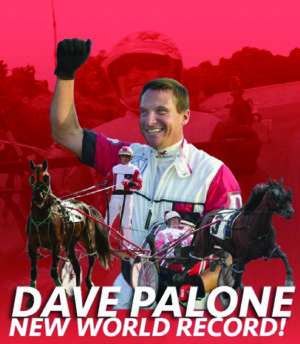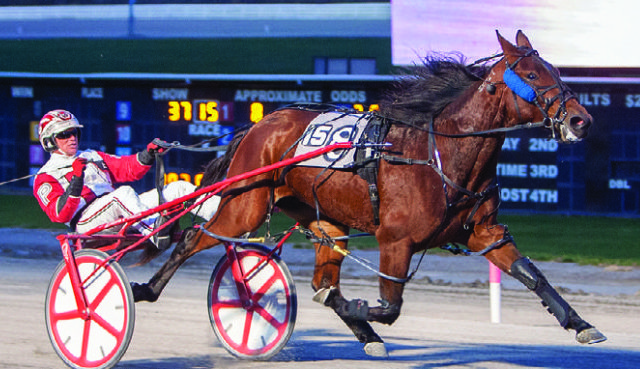With 30-plus years of harness racing under his belt, Dave Palone has amassed an astounding 18,400 wins in more than 75,000 races.
Dave Palone has logged about 18,400 career wins in his 30-plus years as a harness race driver.
That’s an average of about 600 wins per year, with 700 or 800 wins in his better years. Twelve races a day, four days a week, and voila, you have the sport’s winningest driver.
“I’ve done it so many times, I know the horses, I’ve driven most of them, I know their tendencies,” the 56-year-old Palone says. “That’s probably the biggest edge that I have. I know a lot of the horses; I know what they need to win and what they need to race their best.”
Palone lives in Washington, Pennsylvania, about 20 miles from where he grew up. The state has the added bonus of having legalized slot machines, which exponentially increases the purse for his profession, he says.
 Palone is technically a “catch driver,” meaning he doesn’t train horses, he only drives them. He used to train horses, too, when he was younger, but then got too busy with driving and turned the stable over to his younger brother, Michael.
Palone is technically a “catch driver,” meaning he doesn’t train horses, he only drives them. He used to train horses, too, when he was younger, but then got too busy with driving and turned the stable over to his younger brother, Michael.
Catch drivers show up to races after horse trainers pick them. Sometimes, they choose between two horses, he says. “It’s like any other business — you go with your better account,” he says. “If one horse has much better ability than the other horse, it’s pretty much an easy decision.”
Drivers and horses leave the starting gate at about 35 mph and immediately begin jockeying for position, according to Palone. Races are typically one mile in length, and average about 1 minute and 55 seconds. “A lot of races you usually win them or lose in the first quarter-mile,” he says.
“It’s my job to put the horse in the right spot to win the race” by not switching to overdrive too quickly or falling too far back at the start, he says. “It’s like a chess match.”
Palone fell in love with horses at a young age. He started riding in competitions with the 4-H Club, and his father bought a racehorse as a hobby. “I got hooked,” he says.
Unlike most harness race drivers, he’s not a second- or third-generation horseman but learned from his father’s horse trainer, he says.
Palone has had a couple of bad spills over the years, once puncturing a lung and once shattering a femur. “I was right back into the flow of racing within a few weeks. You just shake it off.”
Palone says he’s always been competitive. “I feel like if I’m going to be on that horse for two minutes that week, I owe it to that trainer to give it my best effort to be focused, because he spends seven days a week with that horse.”
In the last three decades there have been a lot of changes in the sport, especially in the construction of “race bikes,” which is where harness drivers sit. When Palone first started, race bikes were made of wood, then they transitioned to titanium, and now they are made of much lighter carbon fiber.
Races are also much faster, he says. “Now it’s just pure speed,” he says. “The horses are bred so well and have so much pedigree that you can race them much harder than you used to.”
Palone estimated he’s won up to $150 million in purses throughout his career, with 5 percent going to him and the rest to horse owners and trainers.
He’s now scaled back on his traveling, preferring to spend more time at home watching his younger daughters grow up and playing golf.
Still, if he meets a really good horse, he’s apt to follow it around. And he gets butterflies when there’s major money and prestige at stake in a race, he says. “I’m intense still while racing. I’m not looking to give up the colors just yet.”
The above appears in the September 2018 issue of the print version of Fra Noi. Our gorgeous, monthly magazine contains a veritable feast of news and views, profiles and features, entertainment and culture. To subscribe, click here.
 Fra Noi Embrace Your Inner Italian
Fra Noi Embrace Your Inner Italian







